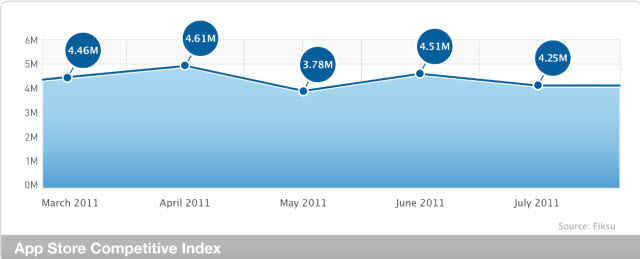The cost of acquiring a new user for iPhone mobile apps declined slightly in July, according to an index monitored by mobile app user acquisition platform Fiksu.
That means July was a less expensive month for mobile marketers looking to acquire loyal users (someone who opens an app three or more times) and getting an app ranked in the app stores. While the one-month aberration isn’t that big of a deal, it is interesting that app developers can use the Fiksu data to get a snapshot of the overall app economy.
Boston-based Fiksu measures the average daily download volume of the top 200 free iPhone apps in the U.S. It reported that there were 4.25 million app downloads per day in July, down slightly from 4.50 million app downloads per day in June. Also, the Fiksu cost per loyal user index decreased 5.5 percent to $1.20 in July from $1.27 a month earlier. The measurement of an average cost per user is a more meaningful return-on-investment metric than click-based ad campaigns. A recent study by eMarketer revealed that 63 percent of mobile marketers were not trying to measure ROI on their ad campaigns or just didn’t know the ROI.
AI Weekly
The must-read newsletter for AI and Big Data industry written by Khari Johnson, Kyle Wiggers, and Seth Colaner.
Included with VentureBeat Insider and VentureBeat VIP memberships.
Fiksu CEO Micah Adler speculated that the July drop in user-acquisition costs is part of a leveling-off process after a pretty rocky ride over recent months. User acquisition costs were as low as 94 cents back in March of this year. But then came Apple’s ban of incentivized promotions, or pay-per-install promotions. Under incentivized promotions, app developers paid companies such as Tapjoy to incent users to download apps via rewards in the apps the users already had. Apple cracked down on the practice, implying it was not okay to buy your way onto the top-ranked apps list. In the months following that change in late April, user acquisition costs rose — to $1.10 in May, (and as noted above) $1.27 in June.
Many marketers had been using incentivized promotions to buy bulk downloads and boost app ranks. Now they are starting to reallocate budgets into non-incentivized promotions that can deliver more loyal users at a lower net cost, said Fiksu vice president of business development Craig Palli.
Fiksu based its index data on 2.7 billion mobile app actions recorded by its platform. Mobile app marketers can use this data to understand the impact of things such as iOS upgrades, sales of mobile devices, advertiser demand and ad network inventory.
Palli said that Fiksu is collecting data on Android devices but has not yet released any index information.
VentureBeat's mission is to be a digital town square for technical decision-makers to gain knowledge about transformative enterprise technology and transact. Learn More
